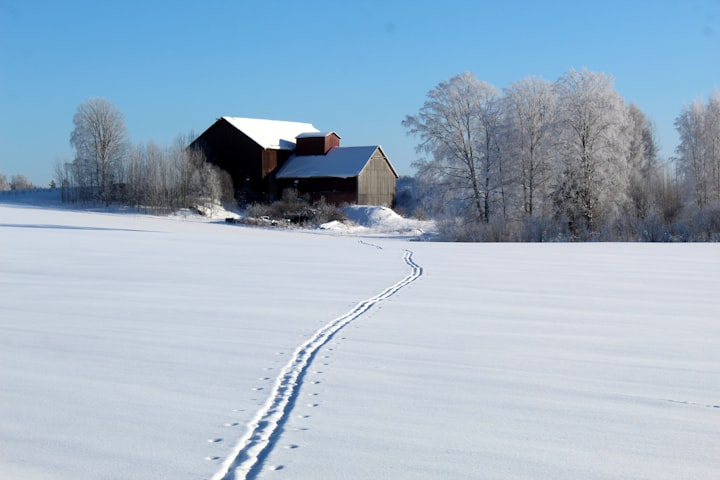The Four Giant Canvases of Hill House
A house, a barn and first light

I was lost. The winter sun sat low in the sky as we weaved through country lanes, my view from the back obscured by frost-bitten hedgerows which occasionally gave way to white fields expanding towards the horizon.
"Nearly there," said my driver as we turned a corner to reveal a grand house, sitting upon a steep hill, a pale Georgian property, covered by ivy, symmetrically proportioned with eight wide windows on the top floor and six on the ground, making space for a large framed front door in the middle, deep red with a grand fanlight positioned above it.
"Here she is," he said, pulling up the driveway, the gradient pressing me back into my seat. I wasn't sure if the driver was referring to the house or its owner, Lady Gregory who'd invited me to house-sit and was hovering outside on the doorstep.
She spoke as I clambered out of the car.
"It's quite lovely, isn't it?"
"Hello, I'm Jonathan York."
"Yes, you're the writer."
"Well, I haven't really written…"
"Come in, it's freezing, the driver will bring in your things, it's getting dark and I need to give you the tour."
Lady Gregory was aristocracy but to me, she looked like a regular old lady, hair pulled back, layers of textured cloth draped over her petite frame, a red pashmina around her shoulders. She was undoubtedly beautiful in her day and I felt a sting of jealousy looking at her elegant bone structure.
"I'm 35," I said, responding to her question about my age.
"Good grief! Do you not have a family? You understand you'll be here for a month by yourself? I don't want a youngster here anyway, running a moc in Hill House, I can't have that, this house is like me…" She looked me in the eyes. "Tired and partied out."
"Oh" I replied, not knowing how to respond.
"This place used to be a social hub," she said, walking as she talked. "Let me give you the tour. You'll need to know the house before I show you the barn."
Six weeks ago, frustrated by insurmountable writer's block, I searched online for remote hideaways, hoping that fleeing North London might thaw the artistic freeze in my head. A year prior, I had quit my job as a lawyer in a bid to reinvent myself after my marriage collapsed. Everyone believed I was having a breakdown, but I insisted it was a breakthrough, my creative self emerging, but perhaps I was playing the role of an artist rather than being one. Perhaps Hill House was further indulgence of an extended fantasy where I am a travelling artist, tactfully avoiding putting pen to paper.
I had not written a single word for four months as I first entered that crumbling Georgian home.
Lady Gregory gestured to rooms as we walked down long corridors. The house was beautiful but cold and dilapidated. High ceilinged rooms were peppered with old furniture and threadbare rugs and floorboards groaned as we walked. Lady Gregory explained there was no central heating and the handful of rooms in use were kept warm by electric radiators. Walking around the house meant walking through bubbles of heat before plunging back into the icy February cold that filled the corridors.
Finally, Lady Gregory announced, "Let's go to my studio in the barn."
Money was impossibly tight when I answered the advert to live at Hill House for a month. It was a perfect offering; remote, no internet or television, a haven where I could write. Most importantly, it was free, allowing me to rent out my property and make a small income whilst in countryside isolation. My only duties were to water Lady Gregory's plants and to look after her paintings. No further instruction was given upon application, but I believed, perhaps naively, I was up to the task.
She unlocked the backdoor with a huge iron key and lead me across a frozen lawn that crunched underfoot towards the run-down barn looming at the end of the garden. Pulling open the barn's sliding doors revealed an art studio, a single huge room, strewn with papers, paints, books, palettes and easels. At each corner were four giant canvases, 6 by 8 foot tall - she told me the dimensions - each with layered oil paints creating dramatic textures, peaks and troughs on the canvases. They were abstract art; interlocking stripes of pastel colours, as if one was looking at the magnified view of a woollen blanket.
"Do people buy these?" I asked. Lady Gregory took my clumsy question with the good grace expected from well-socialised aristocracy.
"Oh yes, but I find it hard to let them go. I work on them for months and they become a part of me, then I have to say goodbye. Each painting I sell is a part of me I have to grow back. It's a painful process. As you get older, you grow slower, so they each leave a space within me. You'll find the same with your writing. You give and give and then it is consumed, judged, poked and examined. They are poking and examining your soul, Jonathan. Goodness knows why we do it."
"I haven't really written mu…"
"Now listen, the oils on the canvases aren't dry. I painted these in rotation, layer one then move onto the next and so forth. It will take at least six months before they are ready to be transported, it takes that long for oil paints to harden. Even then, it might take another year before they're robust enough to sell."
Lady Gregory explained the balance of heat and cold must be monitored in the barn at all times, too hot and the top layers of the paint would crack, too cold and they would do the same. As there was no central heating, she devised a six-hour rota of when the radiators needed to be turned on and off, including a 2am to 8am shift. Every adjustment had to be logged in a large book she handed me.
"Log the times you turn the radiators on and off. Don't worry if you're a few minutes late or early, but write down the exact time, it helps me refine the process. I've been perfecting it for years. Then, each day, at sunset, I'd like you to write a page of text describing the canvases."
I looked at her blankly.
"You are a writer. Why do you think I picked you? I read your article about quitting your job, the one in The Guardian, I've done my research. It was very good, no wonder it won. Now, a page of text at sunset to describe the paintings, their state, their look, how they make you feel. A whole page. It is important you complete this task."
Lady Gregory left after that. She took the same driver out that brought me in. Her bags were already packed and in the hallway when I'd arrived. I must have been in her company no more than 45 minutes, then I was alone in Hill House, just myself and the canvases for one long, winter's month.
---
It was day five when things unravelled. I slept through my 2am alarm after drinking a couple of bottles of red wine from the cellar. I had hoped it would allow me to write, but to no avail; writing about the paintings had consumed all my mental efforts and I'd grown weary of the task. I found it farcical but did it out of duty.
"The paintings look fine. There are no cracks. The heat in the room is balanced. I'm enjoying looking after these magnificent canvases." That sort of uninspiring prose.
On the day in question, I awoke at 11am, my bedroom freezing and panicked as I realised the paintings would be also. I swooped into the kitchen, grabbed the huge iron key, unlocked the back door and pounded across the icy grass as the cold bit into my bare feet. Entering the barn I flicked on the radiators in one fluid movement then anxiously examined each canvas, quickly spotting numerous hairline cracks across each painting.
I paced back and forth between canvases. Immediate thoughts about failure came to mind. Such a simple task I could not complete. A failed marriage, a failed career, my incompetence summed up by these four monoliths of failure.
I stayed in the barn, sticking to the regime for the rest of the day, turning radiators on and off to the minute, hoping the cracks would close up, but if anything they grew wider, more pronounced.
That day my anxiety knew no bounds, exacerbated by a hangover and my winter isolation. At 5pm the sun was low and long shadows cast their way across the sprawling Persian rug covering the barn floor.
I opened the logbook to write my page. I began. "The canvases are" and paused for a moment. "…ruined."
I began a confession, a confession about my incompetence, a mea culpa to Lady Gregory, then to my former self. My writing spilled out onto a second page, then a third and fourth. Sorrow turned to anger and I wrote to God about money, love, health and failure. Why had life been so difficult, why had I drifted aimlessly through a comfortable hell, a gentile misery? The words came forth like a torrent, the disappointment of the paintings opened a well of angst within me and like the steam from a boiling pan, it rattled and shook my hand that formed words, crossed t's, dotted i's and drove across the pages of the large, black book.
I left the radiators on in the barn that night. Tears had come and I slept on the barn floor, the canvases looming over me. I had written twenty pages and then slept heavily. I was empty.
---
Three weeks later Lady Gregory returned. I saw the car pull into the drive before hearing her keys in the lock. I walked into the reception hall to greet her.
"How are my canvases?"
There were no pleasantries. I braced myself to deliver the news but she stopped me.
"Cracked, are they? Each one?"
"Yes," I replied.
"Right, let's see then," she said and walked through to the kitchen, opened the back door and strolled over to the barn.
"Cracks all over them, you're quite right," she said, peering at each one, lifting her glasses and putting them back on her nose numerous times.
"And the book?"
I handed it to her, now full of writing. She flicked through it in silence for a good few minutes as I stood there like a schoolboy, awaiting the consequences of my actions.
"Completed the whole thing? There's hundreds of pages here."
"I've got two more. I bought two more. I wrote a novel."
"About the canvases?"
"Not… really."
"It got you writing though, yes?"
"I, well, I missed one day, the oil cracked, then it got worse, I stuck to the schedule…"
"Yes of course they cracked, that's what they're supposed to do. They all crack. Didn't I say?"
"Are they ruined?"
"Oh no, perfect I say. Ready for shipping."
"But I thought…"
"Listen, Mr York. You are a writer. An artist. As am I. This place, the barn, the house, the countryside, it does something, it brings something out of us. I paint it, you write it. It worked did it not? I needed an artist to look after this place. You fitted the bill. And it seems Hill House repaid you. How's the writer's block?"
"Gone."
"Exactly. Every artist says it. They come here frustrated and leave with a new sense of expression. After reading your application I knew you'd be perfect for the job. Now come, come, let's have some tea before my driver whisks you back to London. You can tell me about your book before you go."
About the Creator
Jamie Jackson
Between two skies and towards the night.






Comments
There are no comments for this story
Be the first to respond and start the conversation.